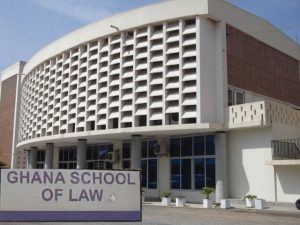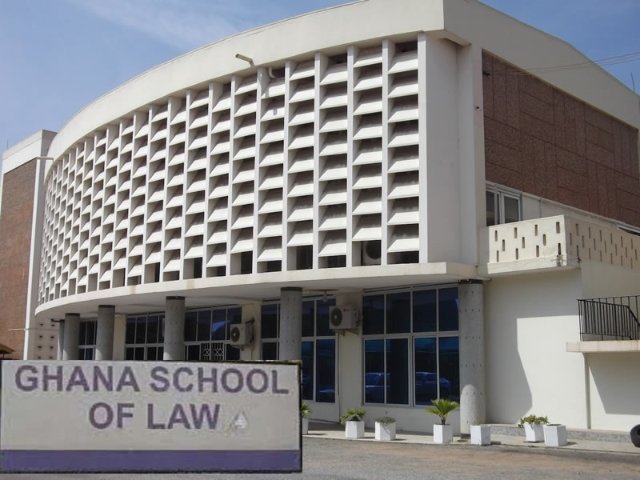
The Students’ Representative Council (SRC) of the Ghana School of Law have presented a petition to the Right Honourable Speaker of the Parliament of Ghana to cause the honourable house to investigate the massive failure of students in the professional law course examinations.
This petition comes days after the latest examination results indicated that out of a total of 525 students, only 64 students passed successfully. 177 have been referred and 284 are yet to repeat the entire exams.
In the morning of Tuesday, 5th March 2019, hundreds of students of the Ghana School of Law and other concerned persons besieged the Parliament House to present this petition to the Speaker.
The students are asking for the House’s intervention purposely to resolve the challenges facing students in the ultimate interest of legal education and justice in this country.
Read the full petition below:
4th March, 2019
THE RT. HON. SPEAKER
PARLIAMENT HOUSE
ACCRA
Dear Sir,
PETITION TO INVESTIGATE THE CAUSES OF MASSIVE FAILURE OF STUDENTS IN THE PROFESSIONAL LAW COURSE EXAMINATIONS
Introduction
- Since the establishment of Independent Examinations Committee (IEC), formerly known as the Independent Examinations Board (IEB) to administer both Entrance and Professional Law Examinations at the Ghana School of Law, there have been unprecedented massive failures in the Professional Law Examinations.
- In the 2017 Professional Law Course Examinations, only 91 students out of a total of about 600 students who passed the examinations. Over 200 candidates were repeated.
- The 2018 Professional Law Course Examinations results is the worst in the recent history of the Ghana School of Law. Out of a total of 525 students who sat the examinations, only 64 representing 11 percent passed all ten subjects. A total of 177 students representing 5 percent were referred in various subjects while a 284 students, almost half the total number of students, were repeated. Again, out of 33 Post-Call Students who sat the examinations last year only 7 representing 21 percent passed. Out of over 200 repeat students who sat the examinations last year only 8 passed.
- The legality of the erstwhile Independent Examinations Board was challenged in the Supreme Court in the case of Asare V Attorney– General and the General Legal Council and the Apex Court held that the IEB was illegal.
- Consequently, Regulation 12 of the Legal Profession (Professional and Post-Call Law Course) Regulations, 2018 (LI 2355) gave legal backing to the 4 member IEC.
- Speaker, the IEC operates to exclude lecturers from the examination process. By its modus operandi, lecturers neither set examination questions nor mark scripts.
- This development has created several challenges including but not limited to:
- Examination questions falling outside the course outline based on which students are taught.
- Deficient and inadequate examination questions which lecturers usually point out in class when discussing past questions with students.
- Wrong set of questions for specific subjects e.g. in 2017 students boycotted the Criminal Procedure Examination because Law of Evidence questions were included in that examination.
- The unpredictable structure of the examinations e.g. in some cases, students enter the examinations hall only to discover that some questions are compulsory.
- Challenges with the marking of examination results. This is evidenced by the fact that many students who hitherto failed specific papers passed upon applying for remarking.
- Again, there have been reports of errors in the tallying of examination results where students upon application for retallying of their marks passed whereas they were failed initially.
- Concerns that in some subjects marking schemes were not available to the examiners. This was indicated in the 2018 examiners report (copy attached) and in some cases examiners reports for specific subjects are not available to both students and lecturers.
- That some of the lawyers who are given scripts to mark give them to juniors in chambers to mark.
- The manual processes of the IEC leaves room for many errors along the value chain of examinations.
- In addition to the above, the IEC delays unduly in the release of examination results since it does not hold itself to any timelines for the release of results.
- Speaker, it is the practice that when the first set of examinations are conducted in June, the IEC holds on with the results until the second set of examinations are conducted in September before releasing the results. For the 2017 and 2018 examinations the results were released in February 2018 and 2019 respectively. Eight months after the conduct of examinations. This practice puts students through a lot of psychological trauma. While we think that this practice is unfair and unreasonable, it is also not akin to international best practice.
- Again, apart from publishing the index numbers of students who passed or were referred in one or two subjects, students are not given a statement of their results.
- The current practice is that students who desire to see their results must visit the records office for an officer to mention their grades to them to write out themselves. They are not allowed to see their actual marks. This practice clearly violates the rights of students to fully access their examination results. There is also a high probability of wrong results being mentioned to students and they would have no means to verify this.
- Given the challenges with the management of the examinations, some students decide to apply for remarking of their scripts. Unfortunately, the cost of applying for remarking is whopping Gh¢ 3,000.00 per script. We contend that this rate is arbitrary since it has not been approved in the Fees and Charges Regulations. It is also too high hence deters students with this amount is so exorbitant hence it prevents students with genuine concerns who are unable to afford it to exercise their right to remarking.
- Repeat students have not been placed for the mandatory internship programme. It is our considered view that this decision is unfair. With the current reforms, students in their first year of the Professional Law Course are required to undertake their internship after their Part 1 Examinations when their results would not have been released. Failure to place repeat students on internship is therefore unfair.
- Following the agitations that greeted the release of the 2017 results in February 2018, the leadership of the Students Representative Council petitioned the General Legal Council and subsequently met with various stakeholders including the Hon. Chief Justice, Her Ladyship, Justice Sophia Akuffo. Unfortunately, there was no favorable outcome as the Honourable Chief Justice maintained that Parliament gave the General Legal Council the power in the LI 2355.
- The General Legal Council in its response to the petition from the SRC indicated in a letter to the SRC dated 18th April, 2018 that their allegations were “unfounded and baseless”. This we find rather unfortunate when in fact students were not invited to adduce evidence to prove their claims.
- The GLC further indicated in paragraph 3 of the said letter that “The Council also decided that it will not react to group communications from the students or Students’ Representative Council on Review, Remarking and Recollation of results in future”.
- By the above statement, the General Legal Council has SHUT THE DOOR to addressing any future concerns about students regarding examinations. This we view as unfair and a gross violation of Article 23 of the Constitution, 1992.
- In March, 2018 the Monitoring and Evaluation Committee of the General Legal Council led by Justice William Atuguba had meetings with students at the Accra Main, Green Hill and the Kumasi Campuses of the Ghana School of Law to obtain feedback from students on the Professional Law Course.
- During the interactions, students raised concerns about challenges with examinations particularly setting questions outside the course outline given to students. The Committee assured students that such incidents would not recur.
- The Monitoring and Evaluation Committee further assured students that provisions in the Legal Profession (Professional and Post-Call Law Course) Regulations, 2018 (LI 2355), which was enacted in March, 2018 particularly after the 2017/2018 academic year intake would not be applicable to students particularly Regulation 33 (3) which states that “A candidate who fails in three or more subjects shall be deemed to have failed the whole examination and may be permitted to write another examination without pursuing another course”.
- The Committee assured students that provisions in the LI 2355 would not be applicable to the 2017/2018 year group of students since their rights has accrued before the enactment of the LI. Unfortunately, that was not the case. The above provision has been applied.
- Upon completion of the 2018 Professional Law Examinations, the Students’ Representative Council, in good faith, submitted a detailed report to the General Legal Council on the examinations. This report provided comprehensive feedback to the GLC on the examinations from the perspective of students. It was the expectation of the Students’ Representative Council that the GLC would consider the content of the report. Unfortunately, that was not the case.
- Eventually, the results of the 2018 PLC examinations were released on February 19, 2019 and it recorded the worst performance in the recent history of the Ghana School of Law.
- Speaker, even though the General Legal Council has closed its doors to any concerns from students relative to examinations, the SRC went ahead to petition the General Legal Council. Unfortunately, the GLC is yet to acknowledge receipt of the petition.
- Having exhausted all internal mechanisms of seeking redress to our concerns, we are left with no choice than seek the intervention of the august House of Parliament.
RELIEFS
Mr. Speaker, given the above situation we demand:
- That a thorough investigation and audit be conducted into the activities and procedures of the Independent Examinations Committee.
- That all failed scripts in Family Law and Practice, Company Law and Commercial Practice in which examination questions were outside of the course outline, should be remarked at NO cost to students.
- That questions outside the course outline should be cancelled and the rest marked over 100 percent.
- That the cost of remarking be reduced from Gh¢ 3,000.00 per script to Gh¢500.00 per script.
- That the repeat policy should be reviewed to conform to the old policy of 50 percent of subjects failed per semester or part one as the case may be.
- That arrangements be made for repeat students to take their examinations within one year to enable successful candidates called to bar within that year.
- That repeat students should be placed on internship.
- That the IEC should publish examiners reports for each examinations conducted.
- That the cumulative release of results be abolished.
- That students should be given hard copies of statement of their results.
CONCLUSION
Mr. Speaker, we came here in our numbers because as we have indicated earlier, the General Legal Council has closed its doors to concerns from students related to examinations.
Secondly, we have absolute confidence in our Parliament’s ability to intervene to successfully resolve the challenges facing students in the ultimate interest of legal education and justice in this country.
While looking forward to a favourable outcome, we wish to assure the leadership of Parliament of our unflinching cooperation in finding a lasting solution to the problem of massive failure of students in the Professional Law Examinations and other challenges affecting legal education in Ghana.
Humbly submitted,
EMMANUEL KWABENA OWUSU AMOAH
SRC PRESIDENT
Cc:
THE PRESIDENT
REPUBLIC OF GHANA
JUBILEE HOUSE
ACCRA
THE CHAIRMAN
COUNCIL OF STATE
ACCRA
THE PRESIDENT
NATIONAL HOUSE OF CHIEFS

